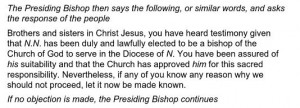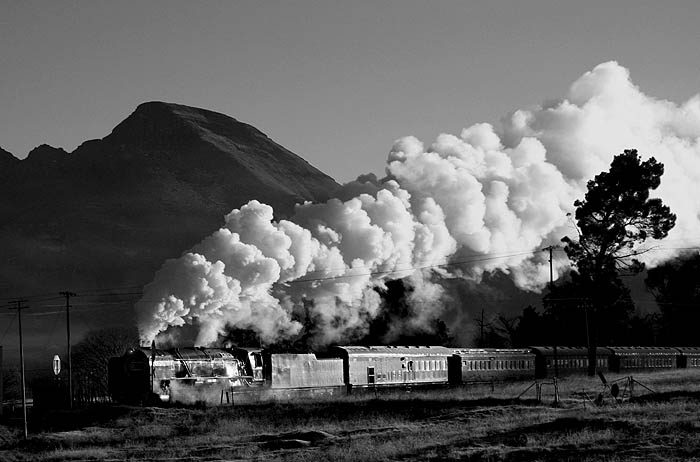By now you know that Bishop Sutton informed the Presiding Bishop that he suspected Bishop-Elect Cook was drunk at the couples dinner that the Presiding Bishop and Sutton attended with their spouses and Cook’s steady companion. Perhaps many a bishop-elect has over-inbibed, but the PB (or her office) and Sutton were both aware of Cook’s DUI conviction although neither seems to have been aware of the publicly available details of that conviction, or its disturbing nature.
Are there examples where information came to light that derailed the consecration of a bishop-elect? The internet wayback machine turns up this article in the Episcopal News Service from 2003:
| Process not perfect What happens when background checks failEpiscopal News Service 11/1/2003 |
Candidates in every diocese of the Episcopal Church must submit to physical and psychological examinations, plus background checks. Still, some background checks and exams do not reveal problems that would prevent a bishop-elect from serving effectively. Consider two examples from three years ago:
Most dioceses rely on Oxford Documents, Oxford Documents performs a credit check, searches criminal records and explores employment history. Bishop F. Clay Matthews of the Office of Pastoral Development said he considers the Oxford Documents survey extensive, but he also recommends that nominating committees do supplemental background checks. Cary Patrick, communications officer for the Diocese of Atlanta, said some people felt the Standing Committee overstepped its authority in canceling Trache’s consecration. Nevertheless, he said, the Standing Committee, Bishop Frank Allen and interim Bishop Robert Tharp all explained the problem thoroughly. “The big learning — and I think this is something the whole church learned — is that the people who scrutinize financial records need to do it differently,” Patrick said. Matthews agreed, saying that a credit check should include both total indebtedness and the nature of indebtedness. One observer of many episcopal elections believes standing committees must avoid “falling in love” with the candidates they consider and ultimately nominate. There is no reason why search committees cannot uncover cases of adultery, predatory behavior or other scandals in a candidate’s background. It’s a matter of digging — not for dirt, but for character. Jean Marani of the Diocese of Florida said her committee handled background checks vigorously. “We asked each candidate, ‘Is there anything in your life that would be an embarrassment to you or to this diocese?’ We didn’t pussyfoot around.” |
There’s at least one way a consecration could be stopped: refusal of three bishops to lay hands on the bishop-elect. Bishop Cook had a record-breaking 10 co-consecrators. How many knew of Sutton’s last-minute concerns? Alternatively, why didn’t Sutton inform his Standing Committee of his concerns and give them the chance to act as the Atlanta Standing Committee did? Finally, was Bishop Clay Matthews (as in 2003, he is head of the Office of Pastoral Development of bishops, including discipline) told in a timely fashion Sutton’s concerns? Even if the Presiding Bishop did not know of the Atlanta precedent, Matthews would have.

Posted by John B. Chilton
* UPDATE: See Sally Johnson’s comment immediately below correcting the ENS story quoted.

